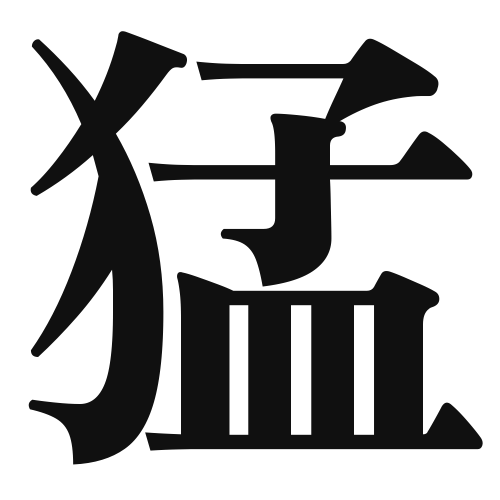1. Overview of Meaning
The kanji “猛” (mou) means “ferocious,” “fierce,” or “violent.” It is often used to describe something that is intense or powerful, whether in terms of emotions, actions, or natural phenomena.
2. Formation and Radical
Formation of the Kanji: The kanji “猛” is a phonetic-ideographic character (形声文字). It combines the radical for “animal” (犭) on the left, which relates to fierceness, and the phonetic component “猛” (mou) on the right, which contributes to its pronunciation.
Radical: The radical of “猛” is 犭, which is associated with animals and often conveys a sense of wildness or ferocity.
3. Examples of Usage
Common Words and Phrases: Some frequently used words that include “猛” are:
- 猛獣 (moujū) – “wild beast”
- 猛暑 (mousho) – “intense heat” or “heat wave”
Example Sentences in Daily Conversation:
- この猛暑は本当に耐えられない。 (Kono mousho wa hontou ni taerarenai.) – “This intense heat is really unbearable.”
- 彼は猛獣のように戦った。 (Kare wa moujū no you ni tatakatta.) – “He fought like a ferocious beast.”
4. Synonyms and Antonyms
Similar Kanji: A kanji with a similar meaning is “激” (geki), which means “violent” or “intense,” but it often refers more to actions or emotions rather than the ferocity associated with “猛.”
Opposite Kanji: An antonym is “穏” (on), which means “calm” or “gentle,” representing a peaceful or mild state, contrasting sharply with the fierceness of “猛.”
5. Cultural and Historical Background
Relation to Japanese Culture: The concept of “猛” is often found in Japanese literature and folklore, where fierce animals or warriors symbolize strength and bravery.
Proverbs and Idioms: One common saying is “猛獣に育てられた子供” (moujū ni sodaterareta kodomo), which translates to “a child raised by a wild beast,” indicating someone who has grown up in a harsh or fierce environment.
